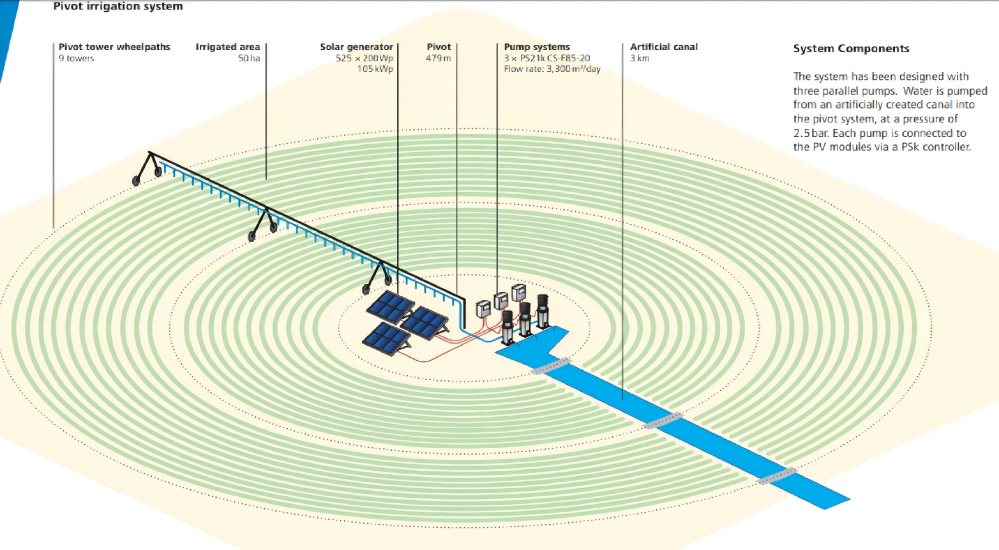What's solar sprinkler irrigation solution?
Photovoltaic Sprinkler Irrigation System is an agricultural irrigation solution that combines solar photovoltaic power generation technology with sprinkler irrigation system. It uses solar energy to provide power for sprinkler irrigation equipment, which can automate the extraction, delivery and spraying of water. This type of system is especially suitable for areas with poor grid coverage, remote or resource poor.
The working principle of solar sprinkler system?
Photovoltaic power generation: Photovoltaic panels convert sunlight into electricity, which is powered by direct current (DC) to the electric motors in the system.
Electric pumps: Electrically driven pumps extract water from underground water sources, rivers or other water sources and deliver it to sprinkler irrigation equipment through a pipeline system.
Sprinkler irrigation device: the water is sprayed to the field or irrigation area through the nozzle in the form of atomization or spray to achieve uniform irrigation.
Control system: Modern photovoltaic sprinkler irrigation systems are usually equipped with automatic control equipment, which can intelligently adjust the irrigation amount according to soil moisture, meteorological conditions and other parameters, and achieve remote monitoring and management.
The advantages of solar sprinkler system?
Environmental protection and energy saving: The use of solar energy to drive irrigation systems does not rely on traditional energy sources (such as power grids or fuel), reducing the consumption of fossil fuels and environmental pollution.
Reduced operating costs: The system has virtually no fuel costs in long-term operation, reducing electricity or diesel bills and reducing farmers' operating costs.
Strong adaptability: suitable for areas with unstable power supply, especially in remote villages, arid areas and poor areas, it can provide a reliable source of energy for agricultural irrigation.
Automation and intelligence: Modern photovoltaic sprinkler irrigation systems are often equipped with intelligent control systems that can automatically adjust irrigation schemes according to meteorological data and soil moisture to ensure efficient use of water resources.
Easy installation and maintenance: Photovoltaic modules and sprinkler irrigation systems are relatively simple to maintain, providing a stable and reliable irrigation service.
The application scenario of system?
Dry areas: In areas where water is scarce, photovoltaic sprinkler irrigation systems can provide continuous irrigation water.
Remote areas: For remote areas without a stable power grid supply, photovoltaic sprinkler irrigation systems are an ideal solution.
Fields and orchards: In agricultural production, especially for crops requiring precise irrigation (such as trees, vegetables, flowers, etc.), photovoltaic sprinkler irrigation systems can provide accurate and efficient water management.
Photovoltaic sprinkler irrigation system not only improves the efficiency of agricultural irrigation, reduces the waste of water resources, but also promotes the development of sustainable agriculture.


